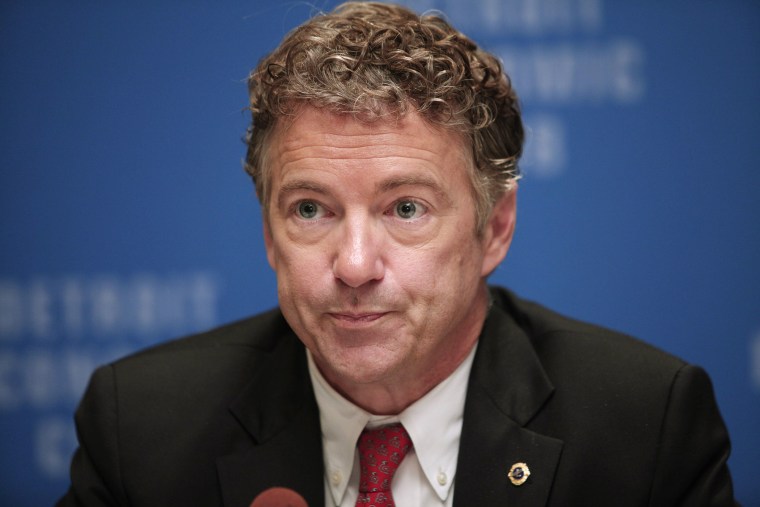In other words, for Rand Paul, cutting off aid to those struggling to find work during a period of high unemployment is actually doing those folks a favor.
Paul, who's openly considering a bid for president in 2016, said in a Friday interview with NBC News that extending unemployment benefits past 26 weeks will hurt workers -- and that paying for it without raising taxes weakens America. "Does it make sense for our country to borrow money from China to give it to the unemployed in America? That is weakening us as a country," Paul told NBC News.
It's important to understand how misguided his argument really is. For one thing, China owns only a small percentage of U.S. debt. For another, there's no reason policymakers necessarily have to borrow the funds needed to help the unemployed (though borrowing costs are low and it makes perfect economic sense to do so).
But the notion that helping the unemployed "is weakening us as a country" is plainly ridiculous. Will the nation be stronger on Sunday when 1.3 million Americans lose their purchasing power, costing the country as many as 300,000 jobs in 2014?
Indeed, it's not unreasonable to consider this a binary choice. Under which scenario is the United States better off: helping these 1.3 million jobless or cutting them off? Paul believes the latter, but every shred of evidence points in the opposite direction.
The senator elaborated on his approach during a recent Fox News interview, arguing, "There was a study that came out a few months ago, and it said, if you have a worker that's been unemployed for four weeks and on unemployment insurance and one that's on 99 weeks, which would you hire? Every employer, nearly 100 percent, said they will always hire the person who's been out of work four weeks."
Ezra Klein did a nice job
explaining why this is a "correlation/causation error of staggering size."
Imagine a study that asked doctors whether they thought a patient who'd been under treatment for a serious illness for four weeks was more or less likely to survive than a patient under treatment for a serious illness for 99 weeks. Of course the doctors would say the patient under treatment for 99 weeks was less likely to survive. Paul would look at that study and argue for removing the treatment from the patient who'd been sick for 99 weeks. After all, doctors thought it made the patient less likely to survive!
It's true that these studies exist, and that the long-term unemployed are often stuck in a self-perpetuating cycle. But Paul's recommended remedy -- abandoning those struggling most by cutting off jobless benefits -- is truly bizarre given the nature of the problem. Ezra added:
The problem for the long-term unemployed isn't that their lavish government checks keep them from wanting jobs. It's that they can't get jobs -- in part because they're unemployed. And that makes them even less likely to get jobs in the future. The long-term unemployed are slowly becoming unemployable. The federal government could move aggressively to put them back to work. It could hire them directly as teacher's aides and park rangers. It could pass a large tax cut for employers who hire new workers and an even larger one for employers who hire the unemployed. It could invest hundreds of billions in infrastructure repair.
Quite right. Policymakers have choices and could take job creation seriously, but instead, Paul believes the nation will be stronger when the unemployed are forced to struggle even more -- and his argument is winning thanks to his like-minded allies who currently control the House of Representatives.
The fact that Rand Paul is eager to cut off the unemployed is alarming. The fact that he doesn't understand the substance of his own argument is considerably worse.
